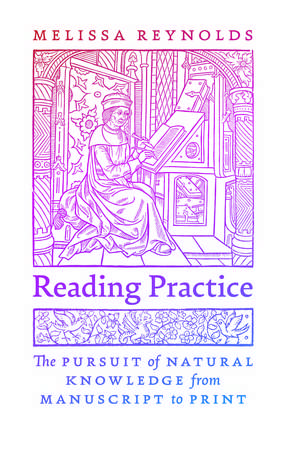Reading Practice: The Pursuit of Natural Knowledge from Manuscript to Print
Autor Melissa Reynoldsen Limba Engleză Paperback – 19 aug 2024
Reading Practice tells the story of how ordinary people grew comfortable learning from commonplace manuscripts and printed books, such as almanacs, medical recipe collections, and herbals. From the turn of the fifteenth century to the close of the sixteenth century, these were the books English people read when they wanted to attend to their health or understand their place in the universe. Before then, these works had largely been the purview of those who could read Latin. Around 1400, however, medical and scientific texts became available in Middle English while manuscripts became less expensive. These vernacular manuscripts invited their readers into a very old and learned conversation: Hippocrates and Galen weren’t distant authorities whose word was law, they were trusted guides, whose advice could be excerpted, rearranged, recombined, and even altered to suit a manuscript compiler’s needs. This conversation continued even after the printing press arrived in England in 1476. Printers mined manuscripts for medical and scientific texts that they would publish throughout the sixteenth century, though the pressures of a commercial printing market encouraged printers to package these old texts in new ways. Without the weight of authority conditioning their reactions and responses to very old knowledge, and with so many editions of practical books to choose from, English readers grew into confident critics and purveyors of natural knowledge in their own right.
Melissa Reynolds reconstructs shifting attitudes toward medicine and science over two centuries of seismic change within English culture, attending especially to the effects of the Reformation on attitudes toward nature and the human body. Her study shows how readers learned to be discerning and selective consumers of knowledge gradually, through everyday interactions with utilitarian books.
| Toate formatele și edițiile | Preț | Express |
|---|---|---|
| Paperback (1) | 216.00 lei 3-5 săpt. | +18.13 lei 4-10 zile |
| University of Chicago Press – 19 aug 2024 | 216.00 lei 3-5 săpt. | +18.13 lei 4-10 zile |
| Hardback (1) | 678.34 lei 6-8 săpt. | |
| University of Chicago Press – 19 aug 2024 | 678.34 lei 6-8 săpt. |
Preț: 216.00 lei
Nou
Puncte Express: 324
Preț estimativ în valută:
41.34€ • 42.70$ • 34.40£
41.34€ • 42.70$ • 34.40£
Carte disponibilă
Livrare economică 04-18 martie
Livrare express 15-21 februarie pentru 28.12 lei
Preluare comenzi: 021 569.72.76
Specificații
ISBN-13: 9780226834894
ISBN-10: 0226834891
Pagini: 304
Ilustrații: 22 halftones, 4 tables
Dimensiuni: 152 x 229 x 23 mm
Greutate: 0.47 kg
Ediția:First Edition
Editura: University of Chicago Press
Colecția University of Chicago Press
ISBN-10: 0226834891
Pagini: 304
Ilustrații: 22 halftones, 4 tables
Dimensiuni: 152 x 229 x 23 mm
Greutate: 0.47 kg
Ediția:First Edition
Editura: University of Chicago Press
Colecția University of Chicago Press
Notă biografică
Melissa Reynolds is assistant professor of early modern European history at Texas Christian University.
Cuprins
List of Figures and Tables
Abbreviations
A Note on Transcriptions and Titles
Introduction
1. The Making of a Practical Manuscript
2. Picturing the Natural World
3. Writing Recipes, Wrangling the Power of Nature
4. Marketing Natural Knowledge
5. Prognostications Past and Future
6. Printing Women’s Knowledge, Censoring Secrets
7. Englishing Medicine and Science
Conclusion
Acknowledgments
Notes
Bibliography
Index
Abbreviations
A Note on Transcriptions and Titles
Introduction
1. The Making of a Practical Manuscript
2. Picturing the Natural World
3. Writing Recipes, Wrangling the Power of Nature
4. Marketing Natural Knowledge
5. Prognostications Past and Future
6. Printing Women’s Knowledge, Censoring Secrets
7. Englishing Medicine and Science
Conclusion
Acknowledgments
Notes
Bibliography
Index
Recenzii
“Anyone interested in the history of books, and especially those who study the history and philosophy of science and medicine, should take note of this important new book.”
“Highly recommended.”
“Vivid and precise, Reading Practice should be read by those interested in the history of the book, the history of science, and anyone who has ever consulted Dr. Google (which, let's be honest, is probably everyone). In addition to centering the reading practices of ordinary people, Reading Practice also does a fabulous job explaining exactly what it looks like and takes to work with medieval manuscripts and early printed texts, making it perfect reading for graduate students and those heading into library research.”
“Drawing upon middle English almanacs, prognostications, charms, medical and household recipes, and guides to daily prayer, Reading Practice upends a narrative that views practical guides and written recipes as the self-evident outcome of hands-on experience. Reynolds argues instead that, from the 1400s to the 1600s, English readers came to appreciate natural knowledge and experience through engaging with words and texts, not through work in the kitchen and workshop. Reynolds insightfully picks her way through the tumultuous advent of Reformation, the spread of printing, burgeoning lay literacy, and expanding markets to tell a complex story about the often-counterintuitive interplay between words and experience, natural and divine, manuscripts and print, and new and old knowledge in early modern England.”
“Reynolds vividly reconstructs the experiences of ordinary men and women as they accessed and used these texts in manuscript and in print. She deftly illuminates their skills in navigating the sales pitches of competing printers and in inserting their own voices into a long tradition of blending textual authorities and direct experience.”
